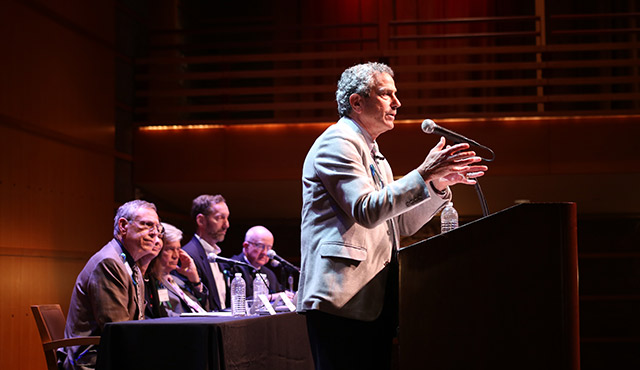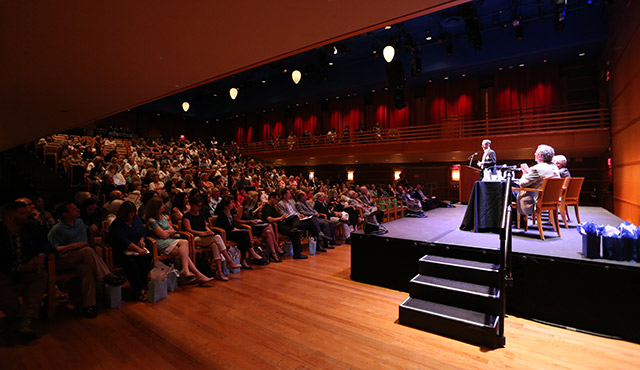Dr. Ira Byock, the internationally known author of three books on end-of-life care, notes that even though today’s adults are living longer, most of us are receiving ‘really bad’ medical care in our last weeks and months. Twenty percent of us will spend time in hospital intensive-care units as death nears, and 70 percent of us will die in nursing homes.
“Dying is hard,” Dr. Byock told an attentive crowd of 350 caregivers, clinicians and clergy gathered at an Aug. 4 forum. “But it doesn’t have to be this hard. We have the knowledge and skills to do this better. Better care is possible and clearly affordable.”
The “Caring Well Through the End of Life” forum was sponsored by Alzheimer’s Orange County and Orange County Advance Care Planning Partners. Held in the Samueli Theatre at the Segerstrom Performing Arts Center, it featured Dr. Byock as keynote speaker. He is founder and chief medical officer of the Institute for Human Caring Providence Health & Services and a professor in the Geisel School of Medicine at Dartmouth College.
A panel of thought leaders, including Diocese of Orange Bishop Kevin Vann, followed Dr. Byock’s speech, with panelists discussing the end-of-life care now and new visions and re-imagining of best practices for the future.
Master of Ceremonies Dr. Vincent Nguyen, director of Hoag CARES Palliative Care Program, noted that some fortunate patients turn to religious leaders in their last days, thus reconnecting with their families and easing into the hereafter.
One who knows that best is Bishop Vann, who spent three years working as a medical technician before he entered the seminary. “I was privileged to work side-by-side with many people of all faiths who took away patients’ fears of dying,” he recalled. “I learned on the job, as well as during my years as a parish priest and pastor. My journeys with all those people who were struggling and dying inform me in my ministry.”
Bishop Vann shared several end-of-life experiences in his own family, beginning with his grandmother, Mary Jones, who suffered from dementia and became in her final days a person family members didn’t recognize.
“We tried to keep her at home with Grandpa, but it wouldn’t work. Yet even in the midst of darkness there were moments of clarity,” he said.
His father and mother were both diagnosed with Parkinson’s disease. His mother had dementia but his father had physical symptoms that left him in terrible pain. Bishop Vann recalled that friends and his children would visit often, easing the old man’s loneliness.
“Caring for Dad was a way for us kids to give back to our parents,” he said. “Dad brought us together and we prayed together. We were around his bed when he passed. I told him that Mom was waiting for him.”
As fatiguing as end-of-life can be for caregivers and family members, it is vital that the dying be surrounded by love.
“It is a chance to express ourselves to those we love and heal the rifts of many years,” Bishop Vann said.
Training caregivers to better understand life’s journey is a critical step in providing the best end-of-life treatment, agreed Dr. Jack Cox, chief medical officer of St. Joseph Health System. “We can talk even to kids about life’s journey,” he said. “We all have an expiration date. We should see death as a natural part of life as it is seen in other cultures.”
End-of-life care is just as important as every stage in the continuum of care, speakers and forum presenters agreed.
“We continually seek ways to provide support for families in Orange County throughout every step of their journey,” said Patty Barnett Mouton, vice president of Alzheimer’s Orange County, an organization that co-presented the forum and boasts a long commitment to education aimed toward improving end-of-life care.
Bishop Vann will participate on an expert panel following the September screening at UC Irvine of “Being Mortal,” a documentary film, Mouton said. Forum co-presenters OC Advance Care Planning Partners offer an ongoing schedule of community and professional education events centered on end-of-life care, she added.
Most of his patients aim to live a good life and a good death, noted Dr. James Mittelberger, director and chief medical officer of the OPTUM Center for Palliative and Supportive Care.
“How can we be the change agents to make death what it needs to be for our patients?” Dr. Mittelberger asked. “We want to help people make every part of their lives good.”
Agreeing with the other panelists that current community-based palliative care is insufficient, he contended that doctors today are poorly trained to share decision-making and often fail to make their patients the center of care.
“Mid-career physicians haven’t learned to have death conversations with patients. Every doctor in the U.S. must have the skill to ask these questions,” Mittelberger added. “We must re-engineer the whole way we engage with patients, and re-engineer the system.”


